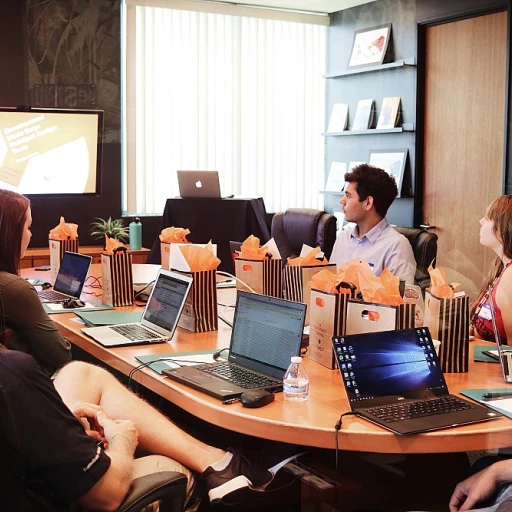
Understanding the Purpose of Pre-Screening Interviews
Defining the Goal of Initial Candidate Assessments
In the realm of recruitment, pre-screening interviews serve as a pivotal first step in the hiring process. They offer hiring managers an opportunity to engage with candidates and filter out those who may not align with the company's requirements, saving valuable time and resources in later stages of the hiring process. By conducting these initial assessments, companies can identify the best potential contributors early on.
Creating a Structured Interaction Framework
A comprehensive pre-screening strategy aims to evaluate key factors such as the candidate's skills, experience, and salary expectations. This preparatory phase sets the foundation for a streamlined recruitment process by clarifying the candidate's alignment with the role. It's during this phase that questions about the work environment and company culture come into play, enabling a deeper understanding of whether a candidate is a good fit for the job.
Enhancing the Candidate Experience
The manner in which screening interviews are conducted can significantly influence the candidate experience. It's crucial that these interviews are approached with transparency and professionalism, leaving a positive impression on candidates. Thoughtful preparation includes identifying specific interview questions that help hiring managers gauge the true potential of applicants. By asking focused questions, hiring teams can better evaluate whether the candidate's goals and values match the company's prospects.
Key Questions to Ask During a Pre-Screening Interview
Essential Screening Questions for Identifying Top Talent
Identifying the right candidate during the pre-screening interview is pivotal for ensuring a successful hiring process. The questions you ask should help determine the candidate's fit for the role and the company culture. Here’s a guideline on key questions to include that will aid in uncovering whether an applicant is suitable for the position.- What motivated you to apply for this role? It's crucial to understand the candidate's motivation. This question can reveal their long-term interest in the position and assess whether their values align with your company's mission.
- Can you describe your experience in a similar role? Diving into the candidate's previous work experience allows you to assess relevant skills and how they might translate to the role in question. This helps in evaluating whether they have a practical understanding of the responsibilities.
- How would you handle a challenge you've encountered in a past job? Behavioral questions like this assess how the candidate approaches problems. It provides insight into their problem-solving skills and ability to work under pressure, key aspects that can influence a hiring manager’s decision.
- What are your salary expectations? A critical question that ensures there is alignment between the candidate's expectations and the company’s budgetary constraints. It can prevent potential disconnects later in the hiring process.
- Why do you want to work at this company? This question assesses the candidate's knowledge of your company and whether they have taken the time to consider how they might fit within the organization. It can indicate their interest level and potential cultural fit.
- What do you know about our company culture? Understanding a candidate’s perception of your work environment is crucial for determining if they would be a good fit. It helps anticipate how they might integrate with current teams and company practices.
Techniques for Conducting Effective Pre-Screening Interviews
Effective Methods to Enhance Your Screening Interviews
Conducting pre-screening interviews is crucial in the hiring process, enabling you to filter top talent effectively. A structured approach not only saves time but also enhances the overall candidate experience.
Here’s a guide to conduct the most effective pre-screening sessions:
- Develop a Clear Structure: Before the interview, align with your hiring managers on the key objectives. Create a blueprint containing specific screening questions that correlate with the job position.
- Personalize the Interaction: Make each candidate feel they are part of the company's recruitment process. Tailor your interview questions to relate to the candidate's experience and the role they aspire to fill.
- Maintain Fluid Communication: Allow candidates to express their skills and experiences freely. This not only gathers relevant information but also reflects your company culture positively, thereby attracting the best talent.
- Assess Compatibility: Evaluate the candidate's potential fit within the work environment and company culture. Questions addressing salary expectations and willingness to adapt can offer deeper insights.
- Utilize Technology: Leverage video interviews or automated systems when possible to streamline the process, ensuring a consistent and efficient evaluation of each candidate.
These methods provide a comprehensive pre-screening toolkit, ensuring your job interviews are aligned with the company's recruitment goals while saving valuable time.
Common Mistakes to Avoid in Pre-Screening Interviews
Common Pitfalls and How to Steer Clear
Pre-screening interviews are a valuable tool in the hiring process, but they can easily go awry if not executed thoughtfully. Below are some frequent mistakes that hiring managers and recruiters often encounter, and advice on how to avoid them to ensure a more effective recruitment process.- Not Defining the Role Clearly: Before starting any pre-screening interview, it’s vital to have a clear understanding of the role you are hiring for. Understanding job requirements helps in forming relevant interview questions and identifying the specific skills and experience that make for a good fit. When the position is not well defined, it leads to mismatched expectations, wasting valuable time for both candidates and the company.
- Neglecting to Prepare Interview Questions: Too often, interviewers enter a screening interview without a structured set of questions. This can result in an inefficient interview process where key information about the candidate is not uncovered, leading to a poor assessment of whether they align with your company culture and the specific role.
- Focusing Solely on Qualifications: While assessing qualifications is important, pre-screening interviews should also evaluate if the candidate fits well within the company's work environment. Overlooking the importance of behavioral questions and only concentrating on technical skills can lead to hiring individuals who may not thrive in the role or the company’s culture.
- Ignoring the Candidate Experience: Every touchpoint in the hiring process contributes to the candidate’s overall experience. Overly formal or robotic screening interviews can mar the candidate's perception of the company, discouraging top talent from pursuing further steps in the recruitment process. Ensure a smooth, respectful, and engaging interaction to sustain a positive candidate experience.
- Overlooking Salary and Benefits Discussions: While salary expectations don’t have to dominate pre-screening interviews, avoiding these discussions entirely can create misalignments later on. It's wise to touch on these aspects to ensure both the candidate and company are on the same page regarding the job offer.
Leveraging Technology in Pre-Screening Interviews
Embracing Technological Tools for Efficiency
In today's fast-paced recruitment landscape, leveraging technology in pre-screening interviews is not just a trend but a necessity. With the right tools, hiring managers can streamline the interview process, ensuring that only the best candidates move forward. Technology aids in saving time and enhancing the overall candidate experience, making it a crucial component of the hiring process.
Video Interview Platforms
Video interview platforms have become indispensable in the screening process. They allow hiring managers to conduct interviews remotely, which is particularly beneficial for candidates who are not in the same geographical location as the company. This flexibility not only broadens the talent pool but also provides a more comprehensive view of the candidate's communication skills and cultural fit.
Automated Screening Tools
Automated screening tools can significantly reduce the time spent on initial candidate evaluations. These tools can sift through resumes, identify key skills, and even rank candidates based on predefined criteria. By automating these tasks, hiring managers can focus on more strategic aspects of the recruitment process, ensuring that the candidates who proceed to the next stage are a good fit for the role and the company culture.
AI-Powered Interview Assistants
AI-powered interview assistants are revolutionizing the way pre-screening interviews are conducted. These tools can analyze candidate responses in real-time, providing insights into their suitability for the position. By evaluating factors such as tone, sentiment, and even body language, AI tools offer an additional layer of assessment that complements traditional interview questions.
Pros and Cons of Technological Integration
While technology offers numerous advantages, it's essential to be aware of its limitations. On the positive side, technology can enhance efficiency, reduce biases, and improve the candidate experience. However, over-reliance on technology might lead to overlooking the human elements of the interview process, such as personal interaction and intuition. Balancing technology with human judgment is key to a successful pre-screening strategy.
Incorporating technology into pre-screening interviews is a strategic move that can transform your recruitment process. By embracing these tools, companies can ensure they are not only attracting top talent but also providing a seamless and efficient hiring experience.
Evaluating the Success of Your Pre-Screening Process
Assessing the Effectiveness of Your Pre-Screening Strategy
Evaluating the success of your pre-screening process is crucial in refining your hiring strategy and ensuring that you are attracting top talent. A well-executed pre-screening interview can save time and resources by filtering out candidates who may not be a good fit for the role or company culture. Here are some key aspects to consider when assessing your pre-screening interviews:
Candidate Feedback and Experience
One of the best ways to evaluate your pre-screening process is through candidate feedback. After the screening interview, ask candidates about their experience. Were the interview questions clear and relevant to the job position? Did they feel the process was fair and respectful? Gathering this feedback can provide insights into how candidates perceive your company and the interview process, helping you improve the candidate experience.
Time Efficiency
Time is a critical factor in the recruitment process. Analyze how long it takes to conduct pre-screening interviews and how quickly you can move candidates through the hiring process. If the pre-screening stage is taking too long, it might be worth revisiting the screening questions or techniques to streamline the process. Efficient pre-screening interviews can significantly reduce the time to hire, allowing your company to secure top talent before competitors.
Quality of Candidates
Another important metric is the quality of candidates who progress beyond the pre-screening stage. Are the candidates who move forward meeting the job requirements and fitting well within the company culture? If not, it might be necessary to adjust the interview questions or techniques to better identify candidates with the right skills and experience.
Alignment with Hiring Goals
Ensure that your pre-screening process aligns with your overall hiring goals. Are you consistently able to fill positions with candidates who excel in their roles? Regularly reviewing the outcomes of your pre-screening interviews can help you determine if the process is effectively supporting your recruitment goals and contributing to a successful hiring process.
Continuous Improvement
Finally, remember that evaluating the success of your pre-screening process is an ongoing task. Regularly review and update your screening interviews, questions, and techniques to adapt to changes in the job market and your company’s evolving needs. By continuously refining your approach, you can ensure that your pre-screening process remains a valuable tool in your recruitment strategy.













